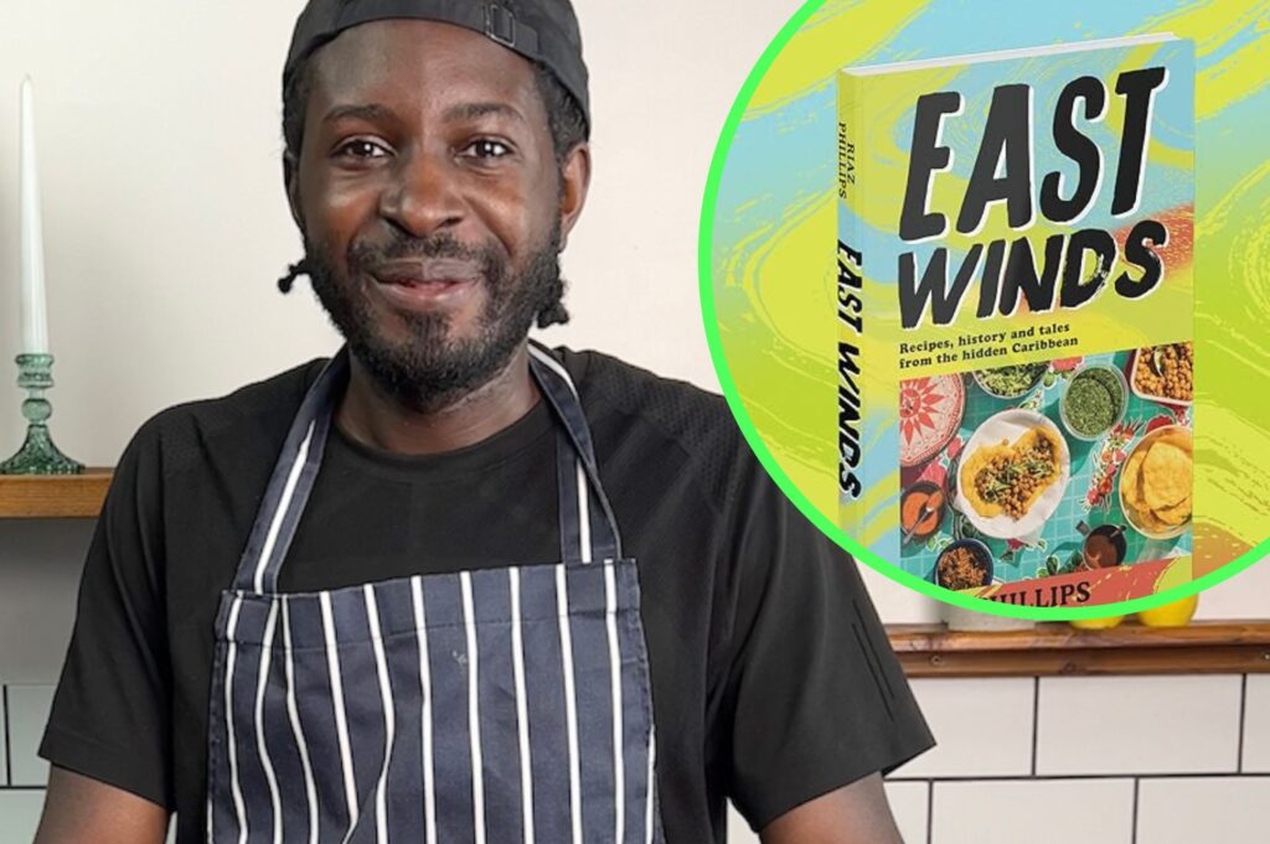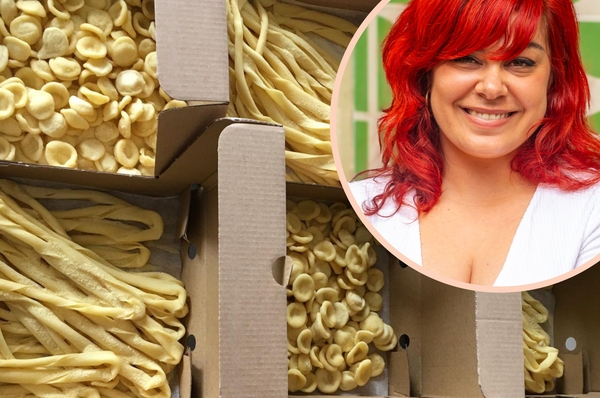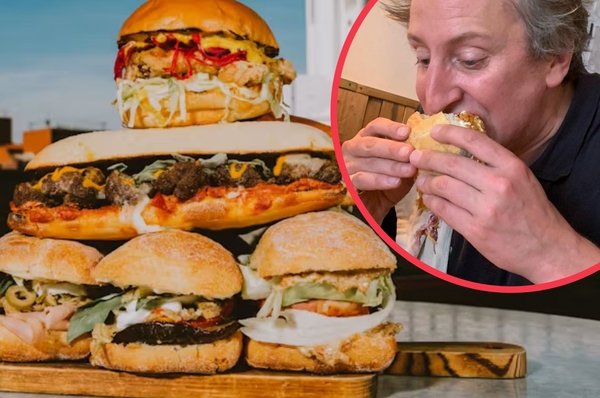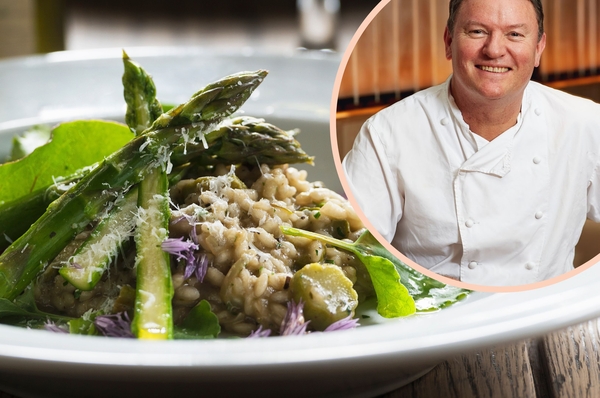Interview
Time’s Table with Riaz Phillips – brown stew chicken, jollof rice and chickpea curry
30 Oct 2023
6m

Every now and then a meal becomes more than just a meal. It could be innovative and exciting – the kind that shapes your cooking going forward – but there’s something equally magic about the dish your mum used to cook you growing up, or even the reliable weekly staple you knock together on repeat.
In this new series, Time’s Table, we chat to people about the food that has left an impact on a time in their life – be it their past, present or future. Trust us, you can learn a lot about someone through what’s on their plate.
Time’s Table with Riaz Phillips
Award-winning food writer, videographer, and photographer Riaz Phillips has made a name for himself as a champion on London’s Afro-Caribbean food scene.
Growing up around Hackney and north London with a persistent curiosity about the food from the diaspora around him, he showcased the people behind the city’s best Caribbean eateries in his book Belly Full, and celebrated them in a way that they are often not afforded.
His first cookbook, West Winds, explored the food of Jamaica, where his grandmother is from. Meanwhile, his latest release East Winds delves into the rich and varied dishes of the “hidden Caribbean” of Guyana, Suriname, Trinidad and Tobago, where his extended family also originates.
Riaz’s culinary influences span from Homerton to Berlin (where he currently lives) to the breadths of the Caribbean, but what are the meals that have particularly left their mark?
Below, we challenge him to pick three – a nostalgic dish, a staple, and a recent inspiration.
 Riaz Phillips chats exclusively to Twisted (Credit: Twisted)
Riaz Phillips chats exclusively to Twisted (Credit: Twisted)
Past – Brown Stew Chicken
“I grew up in a family where everyone cooked, particularly the matriarchs of the family like my mum and my grandmother, who made mostly Jamaican foods like fish, fried dumplings, jerk chicken [and] curry goat.
“There’s something we call hard foods… it’s a collection of [things like] boiled yam, cassava, dasheen. That’s what I associate with my grandma, because no matter what she cooked, she’d always have those on the side, even if it was, like, lasagna or pasta or any random dish. That’s quite common of that older generation of Caribbean people. It’s because hard foods are meant to sustain people for long hours of time.
“We have a big extended family from other places, so for special occasions when we’d go to theirs – family from Trinidad and Guyana – that’s when you’d have things like roti, doubles, curry duck, and have different Caribbean foods. It’s then that I kind of became aware about how diverse the food is.
“One dish [that demonstrates this] would be brown stew chicken. There’s variations of it depending on where you are from in the Caribbean.
“It’s usually made with all-purpose seasoning, which is a mixture of paprika, cumin, black pepper, cinnamon, pimento, and then people from Trinidad make it with a brown sugar caramel, so it tastes almost like sweet and sour. Whereas people from Jamaica, like my grandma, usually [create the same effect] with a sweet tomato ketchup.
“It’s just a meal you have through the week, but it has that excitement and essence of Caribbean food. When I cook it I sometimes use sugar and also put a bit of ketchup in there, or barbecue sauce. The whole idea is that there’s no strict ways of making anything, you can just freestyle it.
“And when you actually look at the ingredients and how it’s cooked it’s something that’s easy to replicate anywhere in the world. In fact, it’s something that you find in so many other regions like China, India… a lot of people who aren’t from the Caribbean really enjoy it, because it has that built-in nostalgia for other places in the world as well.
“That’s what Caribbean food is all about to me.”
Present – Sweet Potato and Chickpea Curry
“Weekly, I make a different curry – sweet potato, chickpea, and coconut milk are the bits that are always in it. Sometimes it might just be regular potatoes and chickpeas; sometimes it’ll be a mix, but it always has curry powder, cumin, garam masala, all-purpose seasoning, and Caribbean green seasoning, which is made from coriander, garlic, spring onions, thyme, citrus, and celery.
“When I was living in Jamaica [five years ago], I stayed in a Rastafari commune in the mountains and they were completely self-sufficient, so they don’t eat anything that they don’t grow themselves. They have their own irrigation systems and they grow their own herbs and seasonings.
“It was just fascinating to see foods picked from their natural environment, as opposed to on the market. It tastes so different. It’s just fresher. I’ve seen people take sweet potatoes, dust off the soil, peel, and eat them straight away.
 Riaz Phillips always falls back on a sweet potato curry (Credit: Getty)
Riaz Phillips always falls back on a sweet potato curry (Credit: Getty)
“That was one of the first times I had seen curry made right in front of you with foods that have just been taken fresh from the ground. [Curry is] one of those things that surprisingly is really nice, even in the middle of summer. People are living in tropical heat and still eating these really rich curries. They were amazing.
“When you’re Jamaican, you always know about Rastafari people, even if they’re not in your own family. It’s just a part of the culture, especially with music – Bob Marley and Lee Parry…they sing about Ital food.
“There was a place called Vital in South Tottenham…it’s closed now but it was a Rastafari vegan shop, and when I ate there, that was the first time I understood that there was this whole world of cuisine that didn’t revolve around meat. In both Rastafari vegan culture and Indo-Caribbean culture, vegetables are actually the centre of the meal, not just the side.
“The curry I make is one of those meals that runs parallel to [this]. When they came to the Caribbean, the Indian people brought curry culture with them, and actually the Rastafari people who didn’t eat meat really related to that dish.
“Today, it’s something that you’ll see in different types of Caribbean restaurants. In Indo-Caribbean places you’ll see aloo and chana, which is potato and chickpeas, and Rastafari places have sweet potato in curries as well, and maybe some other things like cassava.
“It’s one of those dishes people love when you cook it for them. They know most of the ingredients, it’s comforting and they can relate.”
Future – Smoked Jollof Rice
“There are two restaurants, Ikoyi and Akoko, and they’re both leaders of this modern West African cooking in London.
“I believe they both have different versions of a smoked jollof rice, and that kind of blew my mind, in a way. To make it, I guess they’re smoking the different ingredients which then go into a stock, then infusing a stock and then cooking the rice with that stock, so the smokiness is really intense.
“Reframing these old, classic dishes that have always been cooked in one way, and showing that there’s this kind of… I don’t want to say elevated, but there’s definitely this kind of other level of cooking these dishes – it’s really cool. The ways of infusing spices into things; ways of cooking the spices differently.
“When you make a dish and you make it 100 times you get trapped in this one way of cooking it, and you don’t realise that there are other ways.
“I’m not a fine dining chef, I’ve just always been interested in the regular ways of cooking the food – that’s just what I love – having an essence of the ways my grandparents would have cooked it.
“But then you have to remember that when that generation came to England, they didn’t have access to all the same ingredients, so they had to change recipes and they became different from the way that their grandparents made them. So, you always have that licence to be able to change things a little.
“I don’t tend to go to high end West End, Central London restaurants very often, but I like [these ones] because they’re given a space to take their food to that environment.
“Oftentimes food from West Africa and the Caribbean isn’t afforded that space to be seen the same way that other kinds of food is, that’s why I’ll always appreciate what they’re doing.”
Featured image: Twisted/ Penguin Random House
Riaz Phillips author of East Winds: Recipes, History and Tales from the Hidden Caribbean out on Oct 5 from DK Books, £25


